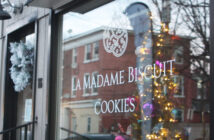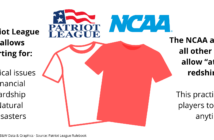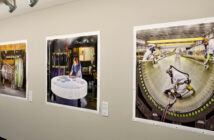
The Office of International Students and Scholars Winter Closet opened on Monday, Oct. 29 in Coxe Hall. The resource helps students who don’t own winter clothing items and is open for two weeks, closing on Friday, Nov. 9. (Adrian Thomas Suarez/B&W Staff)
The Office of International Students and Scholars (OISS) will open this year’s Winter Closet, a resource that provides clothing for the cold weather, on Oct. 29 in the Global Union in Coxe Hall.
The Winter Closet, which started in 2008, aims to support students who need winter clothing items, such as coats, fleeces and scarves. The closet will be open from 9 a.m. to 5 p.m. from Monday to Friday until Nov. 9.
Clara Buie, the assistant director for programs and Global Union in the OISS, said the Winter Closet will help international students transition to Lehigh’s cold climate.
“We recognized that there’s a lot of international students coming from countries where winter is not necessarily a season that they experience,” Buie said. “They may not have the warm items they need for the winter season. In recognizing that, we wanted to find a way to involve the community to contribute to our students in a significant and impactful way.”
The closet’s inventory comes from donations from faculty, staff, students and Bethlehem community members. The program began to collect clothing donations in spring 2018 in preparation.
An anonymous donor from the International Friendship Program, a local Christian group dedicated to supporting international students, donated two boxes filled with fleeces of different sizes and colors to support the closet.
Buie said the organization has built a long-lasting partnership with the Lehigh international student population and has helped enhance the quality of programs such as the Winter Closet.
Lidya Yalew Bekele, ’22, an international student from Ethiopia, helped organize the physical layout of the Winter Closet.
Bekele said the Winter Closet will help international students from tropical countries, like herself, who have experienced difficulty with adjusting to the climate at Lehigh. She said students who are not accustomed to the cold experience an increased risk of illness.
“When (international students) come (to Lehigh), some don’t know the weather, and some don’t know how to choose the right clothes,” Bekele said.
Bikash Shaw, a postdoctoral research associate, said the Winter Closet was highly recommended by his international colleagues. He said the program is useful, especially for students who have never experienced averages of 5-6 inches of snowfall.
“I am from India which is basically a hot country,” Shaw said. “Now, I am coming here wherein it will go negative 10 degrees Celsius in December, so it is very difficult for me to adjust in this cold — and so I found this program very much useful.”
Although the program was initially designed for international students who are from tropical countries, domestic students are also welcome to pick from the assortment of winter clothing.
“There are students who come from warm parts of the country, such as California, Hawaii and Florida,” Buie said. “They may not have the resources to get a winter coat, so absolutely they are more than welcome.”
Buie said the Winter Closet is open to all students in need of winter clothing. She said that no student in need will be turned away.
“We want to reinforce that this is a community-based program,” Buie said. “We have community members that not only want to make sure that students have the warm clothing for the winter, but also know that they are supported by the community.”





Comment policy
Comments posted to The Brown and White website are reviewed by a moderator before being approved. Incendiary speech or harassing language, including comments targeted at individuals, may be deemed unacceptable and not published. Spam and other soliciting will also be declined.
The Brown and White also reserves the right to not publish entirely anonymous comments.
2 Comments
Little things like this can make a big difference because being an international student away from home isdifficult, compounded by our complex culture and language problems. Welcoming and assimilation assistance must come from numerous sources, including the White House, to aid these young people embarking on life’s journey. Most struggle in their efforts and need guidance from schools’ international departments, immigration protection, host families, concerned neighbors and fellow students, and even informative books to extend a cultural helping hand.
Something that might help anyone coming to the US is the award-winning worldwide book/ebook “What Foreigners Need To Know About America From A To Z: How to Understand Crazy American Culture, People, Government, Business, Language and More.” Used in foreign Fulbright student programs and endorsed worldwide by ambassadors, educators, and editors, it identifies how “foreigners” have become successful in the US, including students.
It explains how to cope with a confusing new culture and friendship process, and daunting classroom differences. It explains how US businesses operate and how to get a job (which differs from most countries), a must for those who want to work with/for an American firm here or overseas.
It also identifies the most common English grammar and speech problems foreigners have and tips for easily overcoming them, the number one stumbling block they say they have to succeeding here.
Good luck to all at Lehigh or wherever you study or wherever you come from, because that is the TRUE spirit of the American PEOPLE, not a few in government who shout the loudest! Supporters of int’l students must shout louder.
Excellent idea.